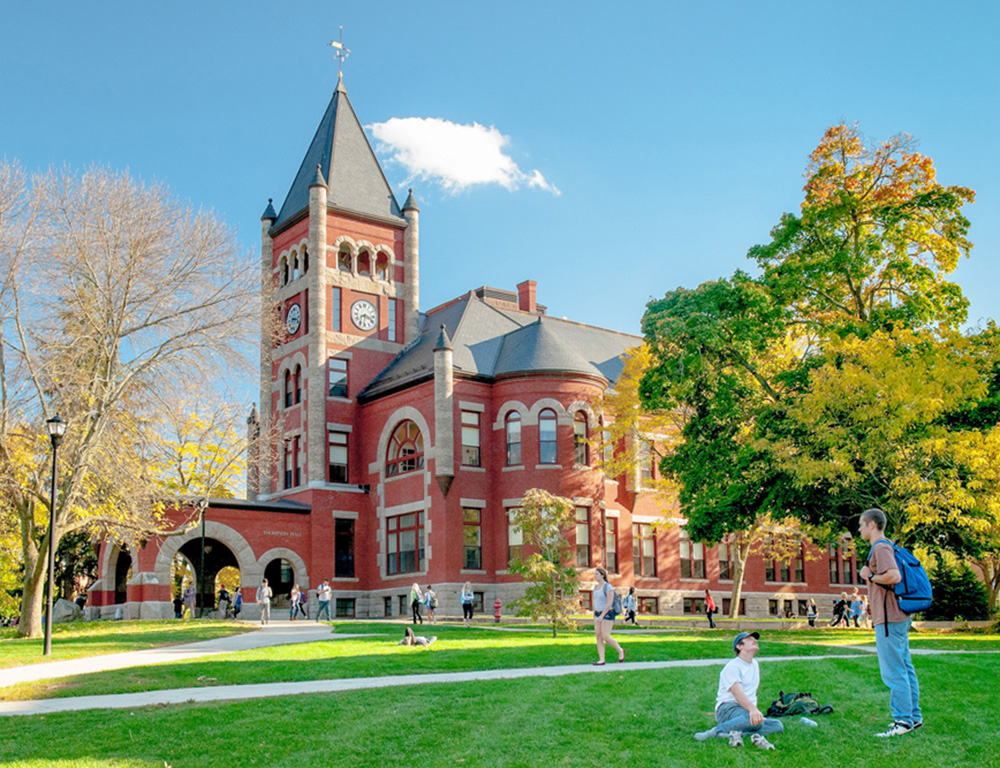Systems Design (Ph.D.)
Systems Design (Ph.D.)

Why pursue a Ph.D. in systems design at UNH?
The systems design program at UNH will help you address contemporary engineering and scientific problems that can be solved only through the cooperation of a variety of disciplines. Our interdepartmental program is aimed at developing scientists/engineers with management ability and engineers with system analysis and design capability. You will learn to make creative technical contributions to complex and to large-scale systems. You will work closely with an interdisciplinary guidance committee to develop a course of study that addresses core degree requirements while also being tailored to your specific focus areas. Systems design engineers are in high demand in academia, research, industry and management.
Program Highlights
Our program offers two professional directions: you will be able to concentrate on developing the skills and technical expertise to work with and direct groups of people on large-scale technical projects, or you can build and develop your capabilities in the theory and analysis of large-scale complex systems. You’ll work across varying departments with award-winning researchers, many of whom have received prestigious National Science Foundation CAREER awards. You’ll have access to world-class laboratories including the John Olson Advanced Manufacturing Center, the indoor underwater facilities at the Jere A. Chase Ocean Engineering Laboratory, and the Flow Physics Facility, which houses the largest boundary-layer wind tunnel in the world.
Potential career areas
- Academia
- Aerospace
- Biomedical engineering
- Communications
- Defense
- Energy
- Environment
- Healthcare
- Information technology
- Large-scale design and management
- Machine learning and intelligence
- Policymaking
- Robotics and automation
- Transportation
Contact
Curriculum & Requirements
The systems design doctoral degree is an interdepartmental program that addresses contemporary engineering and scientific problems that can be solved only through the cooperation of a variety of disciplines. Students in systems design can elect one of two professional directions. The first develops professionals with the technical expertise of a Ph.D. and with the ability to work with and direct groups of people working on large-scale technical projects. The second direction develops engineers with capabilities in the theory and analysis of large-scale complex systems. Concentration in an area of specific individual interest is combined with participation in a larger interdisciplinary project.
Degree Requirements
Following entrance into the program, a guidance committee is appointed for the student by the dean of the Graduate School upon recommendation of the student's area coordinator. This committee assists the student in outlining a program and may specify individual coursework requirements in addition to those required by the area of specialization. The committee also conducts an annual in-depth review of each student's progress and, following substantial completion of a student's coursework, administers the qualifying examination. This committee is also responsible for administering the language examination and/or research-tool proficiency requirements. Coursework and language requirements should normally be completed by the end of the second year of full-time graduate study and must be completed before the student can be advanced to candidacy. Typically, at least 13 courses beyond the Bachelor of Science degree are required.
Upon the successful completion of the qualifying examination and other proficiency requirements, the student is advanced to candidacy and, upon the recommendation of the student's area coordinator, a doctoral committee is appointed by the dean of the Graduate School. The doctoral committee conducts an annual review of the student's progress, supervises, and approves the doctoral dissertation, and administers the final dissertation defense.
To obtain a Ph.D. degree, a student must meet all of the general requirements as stated under academic regulations and degree requirements of the Graduate School. Students are normally expected to take coursework equivalent to two full-time academic years beyond the baccalaureate and to complete a dissertation on original technical research that will require at least one additional year of full-time study.
- A deep understanding of at least one core area within CEPS.
- A broader understanding of at least 1 other area of CEPS (within the same department or another department) or another college that is/are different from the core area of research and that is/are necessary to complete the student’s multi-disciplinary research.
- Ability to think critically and creatively in defining research questions and to outline strategies of inquiry.
- Ability to combine the knowledge and skills across multiple disciplines to solve a complex and/or large-scale problem.
- Ability to document research outcomes comprehensively for publication.
- Ability to communicate research results to scientific audience in conferences.
- Ability to work collaboratively with other peers.
Deadlines
Applications must be completed by the following deadlines in order to be reviewed for admission:
- Fall: Feb. 15 (for funding); April 1 (recommended US; final international); July 1 (final)
- Spring: Dec. 1; Nov. 1 for international students
- Summer: N/A
- Special: N/A
Application fee: $65
Campus: Durham
New England Regional: No
Accelerated Masters Eligible: No
New Hampshire Residents
Students claiming in-state residency must also submit a Proof of Residence Form. This form is not required to complete your application, but you will need to submit it after you are offered admission or you will not be able to register for classes.
Transcripts
If you attended UNH or Granite State College (GSC) after September 1, 1991, and have indicated so on your online application, we will retrieve your transcript internally; this includes UNH-Durham, UNH-Manchester, UNH Non-Degree work and GSC.
If you did not attend UNH, or attended prior to September 1, 1991, then you must upload a copy (PDF) of your transcript in the application form. International transcripts must be translated into English.
If admitted, you must then request an official transcript be sent directly to our office from the Registrar's Office of each college/university attended. We accept transcripts both electronically and in hard copy:
- Electronic Transcripts: Please have your institution send the transcript directly to grad.school@unh.edu. Please note that we can only accept copies sent directly from the institution.
- Paper Transcripts: Please send hard copies of transcripts to: UNH Graduate School, Thompson Hall- 105 Main Street, Durham, NH 03824. You may request transcripts be sent to us directly from the institution or you may send them yourself as long as they remain sealed in the original university envelope.
Transcripts from all previous post-secondary institutions must be submitted and applicants must disclose any previous academic or disciplinary sanctions that resulted in their temporary or permanent separation from a previous post-secondary institution. If it is found that previous academic or disciplinary separations were not disclosed, applicants may face denial and admitted students may face dismissal from their academic program.
Letters of recommendation: 3 required
Recommendation letters submitted by relatives or friends, as well as letters older than one year, will not be accepted.
Test Scores: GRE Required
GRE required. Request official test scores to be sent directly to the Graduate School by the testing service. Test scores more than five years old are not acceptable. Student copies and photo copies of scores are not considered official. Our CEEB code is 3918.
For general information about test scores, including waiver requests and current COVID related impacts, please visit our Test Scores webpage.
Personal Statement/Essay Questions
Prepare a brief but careful statement regarding:
- Reasons you wish to do graduate work in this field, including your immediate and long-range objectives.
- Your specific research or professional interest and experiences in this field.
Important Notes
All applicants are encouraged to contact programs directly to discuss program-specific application questions.
International Applicants
Prospective international students are required to submit TOEFL, IELTS, or equivalent examination scores. English Language Exams may be waived if English is your first language. If you wish to request a waiver, then please visit our Test Scores webpage for more information.



